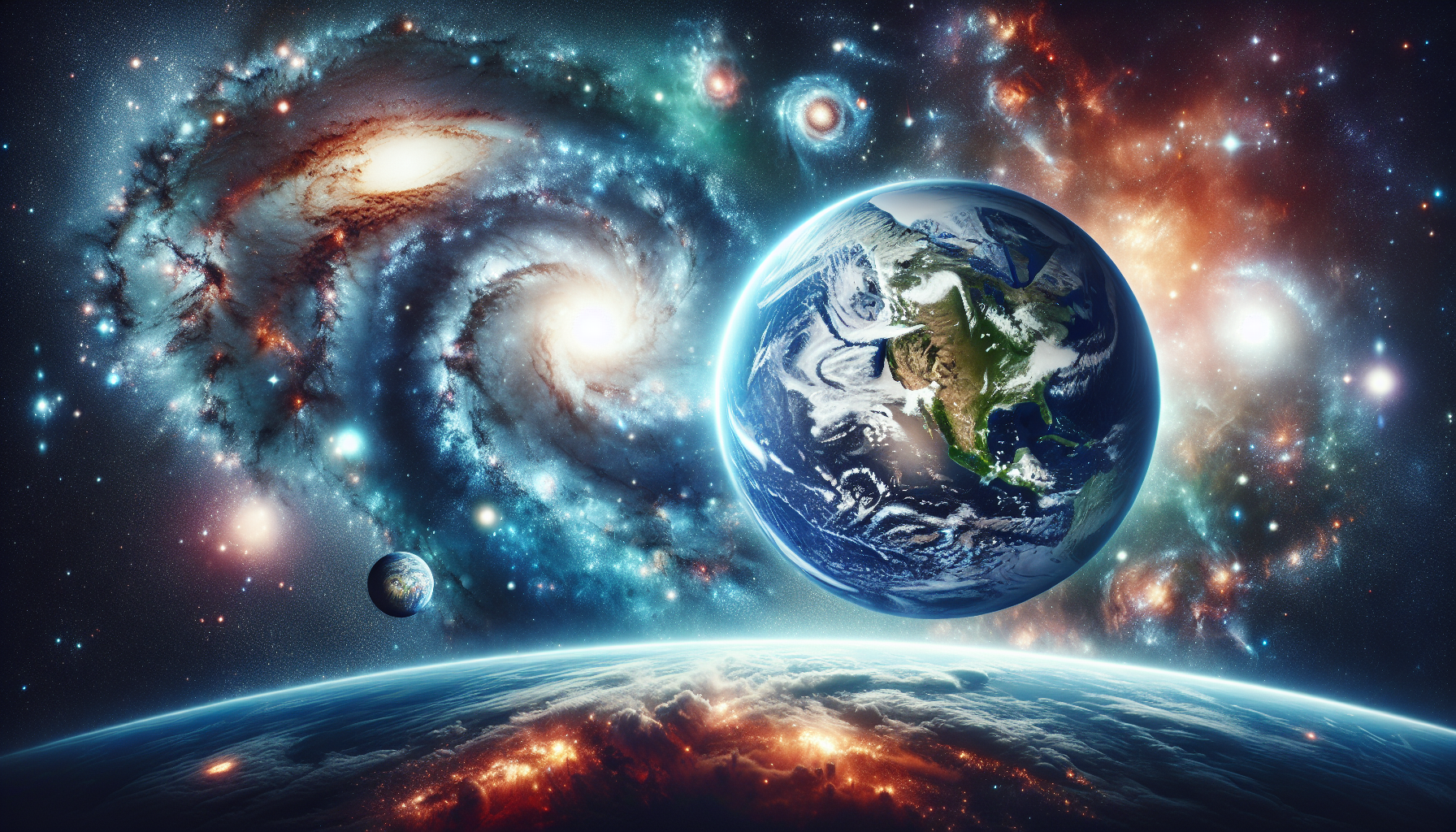In the vast expanse of the universe, with its myriad galaxies, stars, and planets, Earth stands out as a singular point of profound interest. For centuries, humanity has gazed at the heavens, attempting to decipher the cosmic ballet and our place within it. Amidst this celestial exploration, an intriguing question emerges: Could Earth be more central to the universe than modern science often suggests? Welcome to a journey through the fascinating realm of geocentrism, where we explore the age-old idea that Earth might hold a more significant position in the cosmos than we’ve been led to believe. 🌍
Once the prevailing belief, geocentrism placed our planet at the very center of the universe, a notion that was slowly replaced by heliocentrism and later, more complex cosmological models. However, the idea of Earth having a unique or central role in the universe is not entirely relegated to the past. Today, some theories, both scientific and philosophical, suggest that Earth could still occupy a special place in the grand scheme of things. This exploration invites us to reconsider what it means to be at the “center”—is it a physical location, a philosophical perspective, or something else entirely? By examining historical perspectives and modern interpretations, we can gain a deeper understanding of our planet’s significance.
Throughout this article, we will traverse a landscape of thought that includes historical shifts in cosmic paradigms, the resurgence of geocentric ideas in modern contexts, and the implications these have for our understanding of the universe. We will delve into the scientific arguments that once supported geocentrism, explore how these ideas have evolved, and consider how modern science reconciles these ancient concepts with cutting-edge astronomical discoveries. Additionally, we will explore philosophical perspectives that question the nature of “center” and “significance” in an ever-expanding universe. 🤔
Prepare to embark on a thought-provoking exploration that challenges conventional wisdom and encourages a fresh perspective on our cosmic neighborhood. As we delve into the mysteries of the universe and Earth’s place within it, we invite you to question, ponder, and imagine the possibilities that lie at the intersection of science, philosophy, and our innate curiosity about the cosmos. So, buckle up for an intellectual journey through time and space, where Earth may yet be the center of it all. 🚀
Understanding Geocentrism: A Historical Perspective
Geocentrism, the ancient belief that Earth is at the center of the universe, has been a foundational aspect of human understanding for centuries. This perspective was rooted deeply in philosophical, religious, and scientific traditions. Ancient civilizations, including the Greeks and the Romans, embraced this model, which was largely supported by the philosophical works of Aristotle and the astronomical system proposed by Ptolemy. According to Ptolemaic astronomy, the heavens moved in perfect circles around a stationary Earth, creating a harmonious celestial order that mirrored the supposed perfection of the universe.
The geocentric model was not only a scientific explanation but also an ideological one. It reinforced humanity’s perceived special place in the cosmos, aligning with many religious doctrines of the time. In the Christian world, for example, geocentrism was intertwined with theological beliefs, suggesting that Earth, as the abode of humanity, was the primary focus of God’s creation. This reinforced the notion of human centrality and significance in the divine plan.
Geocentrism vs. Heliocentrism: A Comparative Analysis
| Aspect | Geocentrism | Heliocentrism |
|---|---|---|
| Center of the Universe | Earth | Sun |
| Celestial Motion | Planets and Sun revolve around Earth | Planets, including Earth, revolve around the Sun |
| Primary Advocate | Ptolemy | Copernicus |
| Empirical Evidence | Limited to naked-eye observations | Supported by telescopic observations (Galileo) |
| Philosophical/Religious Alignment | Supported religious doctrines of human centrality | Challenged traditional beliefs and inspired new scientific inquiry |
Despite the overwhelming evidence supporting heliocentrism, the geocentric model persisted in various forms due to its deep-seated cultural and religious significance. The shift from geocentrism to heliocentrism was not just a change in astronomical theory but a paradigm shift that redefined humanity’s understanding of its place in the universe.
The Modern Perspective: Earth in the Expanding Universe
With the advancement of science and technology, our understanding of the universe has expanded exponentially. Modern astronomy reveals a cosmos far more vast and complex than our ancestors could have imagined. The Earth, once thought to be the center of all creation, is now known to be just one of countless planets in an ever-expanding universe. This realization has profound implications for our understanding of existence and our place within the cosmic order.
The Role of Technology in Expanding Our Understanding
- Telescope Advancements: From Galileo’s early telescopes to the Hubble Space Telescope, advancements in optics have allowed us to peer deeper into the universe than ever before.
- Space Probes: Missions like Voyager and New Horizons have provided unprecedented insights into our solar system and beyond.
- Computational Power: The ability to process vast amounts of data has enabled scientists to simulate cosmic events and analyze astronomical data with incredible precision.

Conclusion
In concluding our exploration of the theme “Earth: The Center of it All – Exploring Geocentrism and the Universe’s Focus on Our Home Planet,” we’ve delved into the fascinating intersection of science, philosophy, and cultural narratives that frame our understanding of Earth’s position in the universe. Our journey through geocentrism, from its historical roots to its modern-day interpretations, has revealed the rich tapestry of human thought and the ever-evolving quest for knowledge.
Initially, we examined the historical context of geocentrism, tracing its origins to ancient civilizations. Geocentrism served as a cornerstone in the cosmological models of thinkers like Ptolemy, who posited a universe revolving around Earth. This perspective was not merely scientific but deeply intertwined with cultural and religious ideologies, reinforcing humanity’s perceived centrality in the cosmos. It is crucial to acknowledge how this worldview shaped societies and influenced philosophical discourse for centuries.
Transitioning to the scientific revolution, we highlighted the paradigm shift brought about by Copernicus, Galileo, and Kepler. Their heliocentric models, supported by empirical evidence and rigorous scientific inquiry, challenged the geocentric view and paved the way for a more expansive understanding of the universe. This shift was not merely about celestial mechanics but marked a significant transformation in how humans perceived their place in the cosmos, emphasizing humility and curiosity in the face of vastness.
Despite the scientific consensus around heliocentrism, geocentrism’s legacy persists in various forms. Modern discussions often frame geocentrism metaphorically, exploring philosophical and existential implications rather than literal astronomical claims. This contemporary interpretation invites us to reconsider Earth’s unique attributes—its capacity to harbor life, its complex ecosystems, and its cultural significance. It reminds us of our responsibility as stewards of this planet, highlighting the necessity of sustainable practices and global cooperation to address pressing environmental challenges.
Furthermore, the philosophical exploration of geocentrism invites introspection on humanity’s role in the universe. It challenges us to balance scientific understanding with a sense of wonder and reverence for the mysteries that remain unsolved. The dialogue between science and spirituality enriches our comprehension of existence, encouraging a holistic view that appreciates both empirical evidence and the profound questions of meaning and purpose.
Reinforcing the importance of this theme, we recognize that discussions about Earth’s position in the universe are not just academic exercises. They resonate with contemporary issues such as climate change, space exploration, and technological advancements. As we venture further into the cosmos, launching missions to Mars and beyond, we must carry the lessons of geocentrism with us—acknowledging the fragility of our home planet and the interconnectedness of all life.
Inspire yourself with the realization that the universe, vast and enigmatic, still points us back to Earth. Our narratives, scientific endeavors, and philosophical inquiries converge in a call to action: to preserve and cherish the singular oasis we inhabit. Share your thoughts, engage in discussions, and explore further. Here are some active resources for deepening your understanding:
1. NASA’s Earth Science Division
2. The Planetary Society on Space Exploration The Planetary Society
3. Environmental Protection Agency on Climate Change EPA Climate Change
Join the conversation, share your insights, and apply what you’ve learned to foster a more sustainable and harmonious relationship with our planet. Let’s continue this journey together, committed to understanding and protecting the extraordinary world we call home. 🌍✨
Toni Santos is a visual storyteller and conceptual archivist whose work explores the curious, often poetic ruins of pseudoscience and obsolete theories. With a reverence for forgotten frameworks and fantastical logic, Toni illuminates the imaginative spaces where science once drifted into myth, speculation, and symbolic belief.
His creative path is rooted in a fascination with the fringe — from phrenology maps to ether diagrams, hollow earth charts to animal magnetism illustrations. Each visual Toni creates or curates is an invitation to reexamine the strange beauty of discarded knowledge — not as failure, but as cultural reflection, as art born from our eternal desire to explain the unexplainable.
Blending visual design with historical inquiry, Toni gives new life to lost diagrams, metaphysical charts, and antique engravings that once shaped worldviews. His work occupies the liminal zone between fact and fiction, where obsolete models still pulse with philosophical resonance and forgotten charm.
As the mind behind Vizovex, Toni shares illustrated essays, curated collections, and visual reinterpretations that invite others to explore the aesthetic and symbolic value of outdated theories. His goal is not to validate, but to remember — to view these speculative systems as relics of human creativity, vulnerability, and yearning.
His work is a tribute to:
The elegance of error in the evolution of knowledge
The symbolic artistry of discarded explanations
The blurred lines between belief, observation, and imagination
Whether you’re a collector of curious ideas, a lover of forgotten diagrams, or someone drawn to the strange scaffolding of old worldviews, Toni opens a portal to a time when the universe was still full of ghosts, humors, and cosmic fluids — one chart, one symbol, one discredited wonder at a time.





